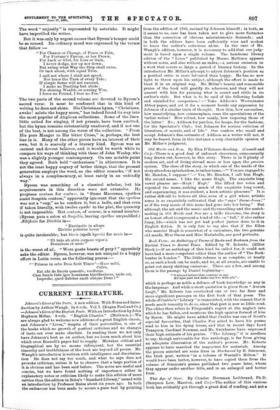Old Maids ani New. By Elsa D'Esterre-Keeling. (Cassell and Co.)—There
is a good deal of unforced cleverness, unnecessarily long drawn out, however, in this story. There is in it plenty of modern art, and of living abroad more or less upon the pension system. The close of the story, in which one of the maids of the story abandons spinaterdom, is rather tame,—" You are engaged to Mr. Hendon, I suppose ? Yes, Mr. Hendon, I call him Hugh. His second name. I like the name Hugh. The exquisite long vowel pleases me—Hugh ! Hugh.' She lifted her voice and repeated the name, making much of the exquisite long vowel, and experiencing, it was evident, a keen artistic pleasure." It is rather difficult to believe all this, even of a girl whose artistic sense is so exquisitely cultivated that she "says ' Burn-Jones ! ' as if the very music of this name had gone into her being." But although the art and the music and the travelling and the match- making in Old Maids and New are a trifle tiresome, the story is an honest effort to represent a kind of life—a " full," if also rather fussy, life—which has not yet had perfect justice done to it in English fiction. It is only fair to say also that it the Ellen who marries Hugh is somewhat of a caricature, the two genuine old maids, Miss Onora and Miss Mariabella, are good portraits.
















































 Previous page
Previous page